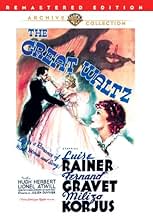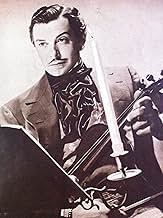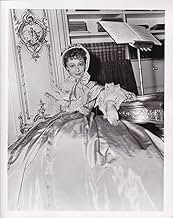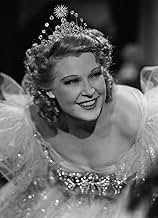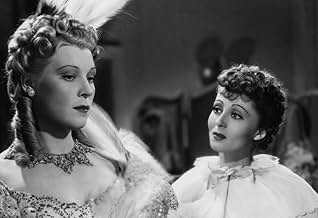IMDb RATING
6.4/10
1.4K
YOUR RATING
Johann Strauss II pursues his passion for waltzes in 1845 Vienna, facing societal resistance. His music gains popularity through opera singers, leading to fame and personal conflicts between... Read allJohann Strauss II pursues his passion for waltzes in 1845 Vienna, facing societal resistance. His music gains popularity through opera singers, leading to fame and personal conflicts between his wife and a passionate affair.Johann Strauss II pursues his passion for waltzes in 1845 Vienna, facing societal resistance. His music gains popularity through opera singers, leading to fame and personal conflicts between his wife and a passionate affair.
- Won 1 Oscar
- 2 wins & 3 nominations total
Fernand Gravey
- Johann Strauss
- (as Fernand Gravet)
Sig Ruman
- Wertheimer
- (as Sig Rumann)
Ernie Alexander
- Revolutionary
- (uncredited)
Featured reviews
Julien Duvivier, the great French director, had a brief career in Hollywood during WWII. Alas, the movies he was involved with, didn't fare as well as the ones he did in France. It must have been difficult for a man of his stature to try his hand at film making in America because of problems with artistic control of his pictures and the way things were done in Hollywood.
"The Great Waltz" was a fine example of what M. Duvivier could do. This glorious 1938 MGM film was one of the most loved films of that period. Not only that, but even if the subject matter, Johann Strauss' life was not accurate, at least his great music is heard in the film. The exquisite art direction Cedric Gibbons gave the picture and the beautiful costumes from Adrian made this a favorite of the movie going public of that time.
The life of the struggling musician who had a lot of talent, but whose music was a departure from what has been heard in Vienna before him, was something movies loved to tell. Whether or not this was a true account of the composer's life, it's still a visually rich film.
Fernand Fravey as Strauss gives a good performance. Luise Ranier makes the suffering and self-sacrificing Poldi, one of her best creations. The true star of the film though, is Milizia Korjus, who as the gorgeous soprano Carla Donner steals the show with her singing and her looks. Hugh Herbert, Alma Kruger, Curt Bois, and the rest of the cast do great work for Julien Duvivier.
"The Great Waltz" is a film that's not seen often these days and it's a shame because it's an excellent excuse for going back to that period and the great music Strauss gave to the world.
"The Great Waltz" was a fine example of what M. Duvivier could do. This glorious 1938 MGM film was one of the most loved films of that period. Not only that, but even if the subject matter, Johann Strauss' life was not accurate, at least his great music is heard in the film. The exquisite art direction Cedric Gibbons gave the picture and the beautiful costumes from Adrian made this a favorite of the movie going public of that time.
The life of the struggling musician who had a lot of talent, but whose music was a departure from what has been heard in Vienna before him, was something movies loved to tell. Whether or not this was a true account of the composer's life, it's still a visually rich film.
Fernand Fravey as Strauss gives a good performance. Luise Ranier makes the suffering and self-sacrificing Poldi, one of her best creations. The true star of the film though, is Milizia Korjus, who as the gorgeous soprano Carla Donner steals the show with her singing and her looks. Hugh Herbert, Alma Kruger, Curt Bois, and the rest of the cast do great work for Julien Duvivier.
"The Great Waltz" is a film that's not seen often these days and it's a shame because it's an excellent excuse for going back to that period and the great music Strauss gave to the world.
A perfect and absolute delight from beginning to end. The great music of Johann Strauss is performed in such beautiful, elaborate settings! MGM reproduced Vienna and the era perfectly. It is too bad this was the only film in which Miliza Korjus appeared. Such a magnificent voice and charming personality! The carriage ride in the Vienna Woods and that final, unbelievable, note she holds for what seems like eternity are never to be forgotten. Luise Rainer is wonderful and could always convey such emotion without ever uttering a word. Perfect casting, with so many great character actors in supporting roles.
I was prepared to find that Julien Duvivier, maestro of such astonishing French pictures as 'Pépé le Moko' and 'Carnet de bal', had sold out completely to Hollywood, but actually 'The Great Waltz' blew me away.
Yes, the story is utter hokum and bears only superficial similarity to the actual Johann Strauss II or the the Vienna of his time. Why is that a surprise to some? It's a given! Hollywood was always like that, now as ever. What Duvivier does manage to convey is the dream of Vienna, the illusory magic of the city that was the capital of musical Europe, and thereby of the world.
Duvivier made this amazing film with attention to every detail, the smallest character performance, even the extras have obviously been minutely directed. The film is always stylistically innovative, the editing fast-paced and often surprising, the style whirling, ecstatic, dynamic, and at all times slightly camp. There are so many show-stopping scenes in the film that I wouldn't even know where to start listing them. The script is wonderful, the dialogue consistently funny, interiors are luminous, the cinematography revolutionary and clearly related to what Rouben Mamoulian was doing in Hollywood in the early 1930's.
The actors? Absolutely great. Fernand Gravey does a fair job, but the two women shine above everything else. Polish coloratura soprano Miliza Korjus sings the Strauss songs in a way that admittedly sound rather corny and old-fashioned today, but as an actress, playing the opera diva that Strauss is two-timing his wife with, she is gorgeously wicked, one of the most glamourous beings even in the Hollywood of the 30's. But even she is overshadowed - by Luise Rainer who, in this picture, can do no wrong in a part that is very, very hard to make substantial. She is Strauss' long-suffering, unselfish wife, but there is absolutely no melodrama in her performance. The evolution of the chararacter that is Poldi Strauss is extremely well-calculated, and she remains the centre, the gravity of the picture. And when we think that now she has suffered long enough, she says, "Now is not a time to lie down, now is time to act!".
Forget all petty reservations and brace yourselves for a real treat, a film that time has all but forgotten, but a masterpiece none the less.
Yes, the story is utter hokum and bears only superficial similarity to the actual Johann Strauss II or the the Vienna of his time. Why is that a surprise to some? It's a given! Hollywood was always like that, now as ever. What Duvivier does manage to convey is the dream of Vienna, the illusory magic of the city that was the capital of musical Europe, and thereby of the world.
Duvivier made this amazing film with attention to every detail, the smallest character performance, even the extras have obviously been minutely directed. The film is always stylistically innovative, the editing fast-paced and often surprising, the style whirling, ecstatic, dynamic, and at all times slightly camp. There are so many show-stopping scenes in the film that I wouldn't even know where to start listing them. The script is wonderful, the dialogue consistently funny, interiors are luminous, the cinematography revolutionary and clearly related to what Rouben Mamoulian was doing in Hollywood in the early 1930's.
The actors? Absolutely great. Fernand Gravey does a fair job, but the two women shine above everything else. Polish coloratura soprano Miliza Korjus sings the Strauss songs in a way that admittedly sound rather corny and old-fashioned today, but as an actress, playing the opera diva that Strauss is two-timing his wife with, she is gorgeously wicked, one of the most glamourous beings even in the Hollywood of the 30's. But even she is overshadowed - by Luise Rainer who, in this picture, can do no wrong in a part that is very, very hard to make substantial. She is Strauss' long-suffering, unselfish wife, but there is absolutely no melodrama in her performance. The evolution of the chararacter that is Poldi Strauss is extremely well-calculated, and she remains the centre, the gravity of the picture. And when we think that now she has suffered long enough, she says, "Now is not a time to lie down, now is time to act!".
Forget all petty reservations and brace yourselves for a real treat, a film that time has all but forgotten, but a masterpiece none the less.
Before I started these comments, I first read many of the others made by a wide range of people - I was amazed to find that some were reading far too much into the storyline,( which everyone who has seen the movie knows it is pure hokum) or belittling the film for its treatment of the life of Johann Strauss. Why not go and see it, and enjoy the sheer entertainment of the Music, the acting of Luise Rainer, the voice of Miliza Korjus (who will ever forget her rendition of "One Day When We Were Young" - who cares if Strauss did or did not write it!), So "The Tales from the Vienna Woods" was written overnight - does it matter that free licence was taken, surely the name of the game is to entertain, and this film does that. Hugh Herbert and Lionel Atwill add fun and spice to one of the more entertaining musicals of the 1930's.
If there is a genre in which even die-hard contemporary fans of old movies seldom care to delve, it is the once-popular musical operetta. I have steeled myself to watch several Jeanette MacDonald and Nelson Eddy movies, and have occasionally been pleasantly surprised, as in my first viewing of ROSE MARIE. I recently caught THE GREAT WALTZ on TCM as part of a festival of Luise Rainer movies, and despite myself I was won over by the skill of the director as well as the opulence of the production.
Miss Rainer's charms elude me. She was pretty and not a bad actress by any means and yet the clammy, self-congratulatory air of masochism and eye-brimming sadness of each of her performances is hard to take. Even when you have to admit that she isn't bad in a given scene, she is insufferable, sometimes almost unwatchable. And she had her most cringing, masochistic and melodramatic role in this picture as the long-suffering wife of a faithless Strauss as played by a puffy Fernand Gravey.
It is Gravey and Miliza Korjus that are the real stars of the film, and this is curious to a modern viewer since neither had the classic good looks of movie stars of the period. What they did have was a stars' confidence and because of the considerable imagination of Julien Duvivier, you believe them as a romantic couple and as stars intoxicated with their own love and talent.
But what is impressive about THE GREAT WALTZ is the way Duvivier transforms potentially dull and static numbers into surreal flights of fantasy. He isn't afraid to be delirious or silly so a few set-pieces unexpectedly catch your attention, make you laugh and then impress you with their theatricality and verve. Such is the orgasmic waltz sequence that takes place in and around a bandstand in the Vienna Woods in which Korjus decisively seduces Gravey. It is Duvivier's attention to detail that makes it: the way Korjus jackknifes to the ground in Gravey's arms and removes her organdy picture hat, the gorgeous line of trees hung with Japanese lanterns on a moonlit set, the way she staggers and tumbles onto the grass after her trilling climax, inviting greater liberties (despite the all-girl orchestra looking on), all of these images make the scene breathless, ludicrous, memorable.
And just because we have blessedly forgotten Strauss's dreary wife, Duvivier concocts a spectacular scene for Rainer too: publicly confronted by her husband's faithlessness, she hurriedly dresses in silks and crinolines determined to kill herself or someone else on the night of his opera debut. Sweeping out of their huge house and down their long staircase to the strains of a waltz, sweeping into a baroque opera house and up an even longer set of steps, she stops, awestruck while several jump cuts reveal the enormity and grandeur of the theatre, the rapt audience and the triumph of her rival, who defiantly swirls into a lavish stage waltz. In contrast, Rainer's smiling-through-tears routine afterward seems an anti-climax, though it is an admirable piece of showmanship and hugely entertaining despite a shrill note of barely controlled hysteria she has cultivated throughout the sequence. Or maybe because of it. Rainer's few strengths as an actress are utterly linked to her considerable weaknesses.
So I'm now not surprised to learn of this film's great success at the time, though I do wonder why the Mac-Eddy productions never got as creative a craftsman as Duvivier to plan and film their pictures. If he had they might be more widely admired today beyond the group of fast-ageing fans who first loved them in the '30s. But maybe nothing can revive interest in this most unfashionable of movie genres.
Miss Rainer's charms elude me. She was pretty and not a bad actress by any means and yet the clammy, self-congratulatory air of masochism and eye-brimming sadness of each of her performances is hard to take. Even when you have to admit that she isn't bad in a given scene, she is insufferable, sometimes almost unwatchable. And she had her most cringing, masochistic and melodramatic role in this picture as the long-suffering wife of a faithless Strauss as played by a puffy Fernand Gravey.
It is Gravey and Miliza Korjus that are the real stars of the film, and this is curious to a modern viewer since neither had the classic good looks of movie stars of the period. What they did have was a stars' confidence and because of the considerable imagination of Julien Duvivier, you believe them as a romantic couple and as stars intoxicated with their own love and talent.
But what is impressive about THE GREAT WALTZ is the way Duvivier transforms potentially dull and static numbers into surreal flights of fantasy. He isn't afraid to be delirious or silly so a few set-pieces unexpectedly catch your attention, make you laugh and then impress you with their theatricality and verve. Such is the orgasmic waltz sequence that takes place in and around a bandstand in the Vienna Woods in which Korjus decisively seduces Gravey. It is Duvivier's attention to detail that makes it: the way Korjus jackknifes to the ground in Gravey's arms and removes her organdy picture hat, the gorgeous line of trees hung with Japanese lanterns on a moonlit set, the way she staggers and tumbles onto the grass after her trilling climax, inviting greater liberties (despite the all-girl orchestra looking on), all of these images make the scene breathless, ludicrous, memorable.
And just because we have blessedly forgotten Strauss's dreary wife, Duvivier concocts a spectacular scene for Rainer too: publicly confronted by her husband's faithlessness, she hurriedly dresses in silks and crinolines determined to kill herself or someone else on the night of his opera debut. Sweeping out of their huge house and down their long staircase to the strains of a waltz, sweeping into a baroque opera house and up an even longer set of steps, she stops, awestruck while several jump cuts reveal the enormity and grandeur of the theatre, the rapt audience and the triumph of her rival, who defiantly swirls into a lavish stage waltz. In contrast, Rainer's smiling-through-tears routine afterward seems an anti-climax, though it is an admirable piece of showmanship and hugely entertaining despite a shrill note of barely controlled hysteria she has cultivated throughout the sequence. Or maybe because of it. Rainer's few strengths as an actress are utterly linked to her considerable weaknesses.
So I'm now not surprised to learn of this film's great success at the time, though I do wonder why the Mac-Eddy productions never got as creative a craftsman as Duvivier to plan and film their pictures. If he had they might be more widely admired today beyond the group of fast-ageing fans who first loved them in the '30s. But maybe nothing can revive interest in this most unfashionable of movie genres.
Did you know
- TriviaToscha Seidel, the Russian virtuoso violinist, was hired especially to dub the solos on the soundtrack for Johann Strauss (Fernand Gravey) and began a new career working as a concert master at MGM and other studios.
- Quotes
Johann 'Schani' Strauss II: Thanks for firing me, Mr. Wertheimer. Goodbye, you worms!
- ConnectionsFeatured in Another Romance of Celluloid (1938)
- SoundtracksTales From the Vienna Woods, Op.325
(1868) (uncredited)
Music by Johann Strauss
Lyrics by Oscar Hammerstein II
Hummed by Fernand Gravey as it is being composed
Sung by Miliza Korjus
Played as background music often
- How long is The Great Waltz?Powered by Alexa
Details
- Runtime1 hour 44 minutes
- Color
- Aspect ratio
- 1.37 : 1
Contribute to this page
Suggest an edit or add missing content



